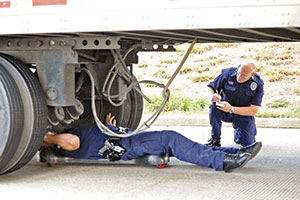Senior Reporter
CVSA Concerned With HOS Exemptions

The increasing number of regulatory exemptions approved by the Federal Motor Carrier Safety Administration is causing confusion and inconsistencies in enforcement by roadside inspectors, according to the head of the Commercial Vehicle Safety Alliance.
“While CVSA does not object to these exemptions on an individual basis, exemptions complicate the enforcement process, causing confusion and inconsistency in enforcement, which undermines the very foundation of the federal commercial motor vehicle enforcement program uniformity,” CVSA Executive Director Collin Mooney said in a Feb. 18 letter to Scott Darling, FMCSA’s acting administrator.
Mooney said that in the past year, the agency has granted more than 20 exemption applications and renewal requests.
“Some of the final rules exempt vehicle equipment, such as mounting of video devices to windshields and the transportation of metal coils,” Mooney said. “There also have been several driver exemptions, including records of duty status exemptions and exempting certain drivers from the requirement to obtain a commercial driver license.”
The large number of exemptions also puts an undue training burden on agencies “that must be diligent in informing all inspectors of the new exemptions and ensuring they understand and apply the exemptions properly,” Mooney said.
With so many exemptions, it is possible that roadside inspectors no longer will enforce the regulations accurately or may stop enforcing certain regulations altogether, he added.
“If a roadside inspector is in doubt whether an exemption is applicable to a current roadside situation, that inspector is more apt to skip citing the potential violation, thus reducing the effectiveness and safety benefit of the regulations,” Mooney said.
Mooney encouraged the agency to invite its state and local partners who perform the vast majority of roadside inspection and enforcement to the table when working on new or updated regulations and new or updated exemptions.
“FMCSA should not overlook the experience of their state and local partners,” Mooney said.
Agency spokesman Duane DeBruyne said the letter was under review.
To keep up with the exemptions, CVSA maintains an “exemptions tracker” list.
The group’s tracker file currently has 29 exemptions, the vast majority of which are hours-of-service and equipment-related.
Mooney said he believes there are so many because technology advances much more quickly than the slow rulemaking process.
The exemptions most difficult to track are those related to drivers’ hours — and likely will get tougher to follow, Mooney told Transport Topics.
“With electronic logging devices coming online within the next couple of years, we are anticipating all segments of the industry lining up for exemptions,” Mooney said.
While CVSA follows the daily exemption approvals on the Federal Register, it’s difficult for an inspector or motor carrier to remember when they expire.
“It creates a heartache for industry, a heartache for law enforcement and government,” Mooney said.
For example, video event recorders have been in exemption status for about the past nine years, he said.
“At some point, the regulation needs to be updated to reflect the change of environment,” Mooney said. “The regulations need to stay current with today’s practices.”




